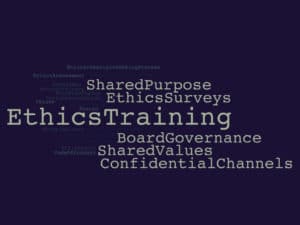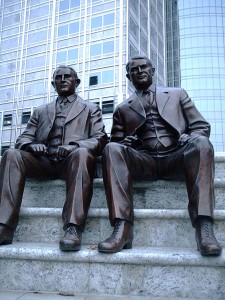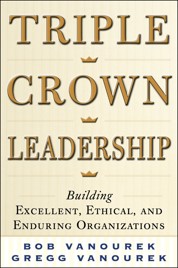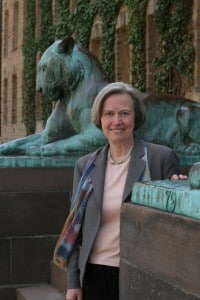
What’s So Hard About Ethics?
Why are ethical breakdowns in organizations so common? Why do so many good people make bad decisions? Look at the “wall of shame” of organizations abusing trust recently: AIG, Barclays, Bear Stearns, BP, Countrywide Financial, Galleon Group, Goldman Sachs, HSBC, ING, Johnson & Johnson, Lehman Brothers, MF Global, Standard Chartered, Walmart, and many more. It’s not just business, by the way. Look at the doping scandal in cycling (and baseball). Look at Penn State University, the Boy Scouts, and the Catholic Church. Look at governments around the world, from India and Italy to China, Russia, and Venezuela. And there is

More Leadership Half-Truths
Many leaders operate from half-truths or outright misconceptions about leadership. Here are more examples, adding to our prior post, “10 Leadership Myths and Half-Truths.” Half-Truth: Leaders Hire the Most Competent People Yes, leaders hire for competencies and skills, but equally important is to hire and promote people with character, emotional intelligence, and cultural fit. We call it head and heart. Lynn Easterling, Senior Director, Worldwide Operations, Legal Services at Cisco, told us, “I can teach the hard skills, but I can’t teach good character or good relational skills.” Berkshire Hathaway CEO Warren Buffett said, “I look for three things

Vanguard’s Values-Based Visionary: Jack Bogle
Interview with John Bogle Founder and Former Chairman and CEO, The Vanguard Group Leaders Speak Series The Vanguard Group is an investment company with over $2.0 trillion in assets, offering mutual funds and other financial products and services. The investors who place money in the funds own Vanguard. Based on his undergraduate thesis at Princeton, founder and former chairman John (Jack) Bogle is credited with the creation of the first index fund and driving costs down in the mutual fund industry. John Bogle, The Vanguard Group Mr. Bogle founded Vanguard in 1975 and served as chairman and CEO of Vanguard until 1996, and

Values-Based Leadership with an Indomitable Will
Interview with Tom McCoy Former Executive Vice President, AMD Leaders Speak Series Tom McCoy Founded in 1969, Advanced Micro Devices, Inc. (NYSE: AMD), or AMD, is a Fortune 500, multinational, semiconductor company and the second largest global supplier of microprocessors behind Intel. Thomas M. McCoy joined AMD in 1995 as general counsel and secretary, later also serving as the Chief Administrative Officer. When we interviewed him, he was the Executive Vice President of legal, corporate, and public affairs, which also included strategy. McCoy is now a partner in the global law firm of O’Melveny & Myers in Washington, D.C., where

Leadership Is a Group Performance
Leadership a group performance? Ridiculous, right? It’s true. In this age of intense competition, information overload, and downsizing, no leader can do it alone. The amount of work coming into your inbox seems infinite. The faster you turn it out, the faster new stuff roars in. So how do you cope? You recognize that the old leadership model of a leader directing all activities is obsolete. Of course leaders need followers, but they also need to unleash other leaders, even within the organizational hierarchy. The hierarchy isn’t going away, in spite of what some authors say about the lattice network

The 3 Questions Asked of Every Leader
Legendary football coach Lou Holtz, now retired and in the College Football Hall of Fame, had an uncanny ability to turn losing teams into winners. During his college coaching career, he compiled a record of 249 wins, 132 losses, and 7 ties. Holtz’s 1988 Notre Dame team was undefeated and determined to be the consensus national champion. Holtz said that players had three implicit questions about a new coach–the same questions the coach has about players. These questions apply to any leader. 1) Can I trust you? Like life itself, leadership is all about relationships. Without trust, these relationships are

What Makes Mayo Clinic Great
Interview with Drs. Leonard Berry and Kent Seltman Authors of Management Lessons from Mayo Clinic Leaders Speak Series Mayo Clinic, founded in 1864, is a global leader in health care delivery, research, and education. With its four main hospitals and additional affiliated hospitals and clinics, Mayo serves more than a million patients annually with revenue of over $8 billion. For over twenty years, Mayo hospitals have earned top rankings from U.S. News & World Report. The Clinic has placed on Fortune’s prestigious “100 Best Companies to Work For” list for the past nine years. Drs. Leonard Berry and Kent Seltman

The Leader’s Worst Enemy: Ego
Of all the leadership traps, none is more fatal than ego. When others around you are whispering how wonderful you are, how fortunate the group is to be led by you, then even the strongest of wills can break. Or, if you are so insecure that you must feed your own ego, then your leadership will fail. People will intuitively sense you are in it for yourself, not them. Greek myth celebrates the Oracle at Delphi, a powerful city-state around 1600 BCE, where entrances to various temples had inscriptions over their entrances, such as “Know thyself” and “Nothing in excess.”

Transforming a University
Interview with Dan Ritchie Former Chancellor, University of Denver Leaders Speak Series Dan Ritchie was the Chancellor of the University of Denver (known locally as DU) from 1989 through mid-2005, a particularly challenging time. Prior to that post, Ritchie was an executive at MCA-Universal and then CEO of Westinghouse Broadcasting before taking up ranching in Colorado. Ritchie is currently the Chairman and CEO of the Denver Center for the Performing Arts and Chairman Emeritus of DU. In the 1980s, DU was in crisis, borrowing money to make payroll with over $60 million in deferred maintenance on buildings. Ritchie enlisted cable television

10 Leadership Myths and Half-Truths
Many leaders operate from half-truths or outright misconceptions about leadership, often leading to major mistakes. Here are examples. LEADERSHIP MYTHS Myth 1: Leaders Are Born, Not Made Many people believe that leaders are born, not made. We disagree. Some people may have more natural intelligence, be more outgoing, have innate speaking skills, or whatever, and these may be helpful in leadership. But leadership skills can be learned, not in the old lecture-take-notes model, but through experience, dialogue, role modeling, feedback, coaching, mentoring, and more. Leadership is learned, not an innate trait of the gifted few. Myth 2: Leaders

A Tireless Focus on Excellence
Interview with Steven Rothstein President, Perkins School for the Blind Leaders Speak Series Founded in 1829, Perkins School for the Blind operates in more than sixty countries with revenue of over $50 million. It offers free audio, Braille and large print books, and hundreds of newspapers by phone. The operations are complex, including a school, early intervention program, library, teacher training initiatives, publishing house, manufacturing division, technology division, and special services for the elderly. Marty Linsky, who teaches leadership at Harvard’s Kennedy School of Government, described Perkins and its President, Steven Rothstein, to us: “Rothstein took an organization that had

Creating a Great Place to Work
Interview with Mary Ann Tocio President and COO, Bright Horizons Family Solutions Leaders Speak Series Founded in 1986, Bright Horizons Family Solutions is a leading provider of employer-sponsored child care, early education, and work/life solutions. Conducting business in North America, Europe, and India, the privately held company has created employer-sponsored child care and early education programs for more than 850 clients, including more than 130 of the Fortune 500. Bright Horizons has consistently been the only child care organization named to the “100 Best Companies to Work for in America” list by FORTUNE magazine. Here are excerpts of our interview

Leading a World-Class Institution
Interview with Dr. Shirley M. Tilghman President, Princeton University Leaders Speak Series Founded in 1746, Princeton University is consistently ranked as one of the finest institutions of higher education in the world. An honor-system school, the university’s informal motto is “Princeton in the Nation’s Service and in the Service of All Nations.” Distinguished alumni, students, and university leaders range from James Madison to Woodrow Wilson, F. Scott Fitzgerald, Eugene O’Neill, Jimmy Stewart, Jeff Bezos, Eric Schmidt, Meg Whitman, Ben Bernanke, Michelle Obama, and many others. Princeton is associated with 36 Nobel Laureates, 19 National Medal of Science winners, seven

It Takes Teamwork, Trust, & Values to Win
Leadership insights from John Krol Former chairman and CEO, DuPont Leaders Speak Series E. I. du Pont de Nemours and Company, commonly referred to as DuPont, is one of the world’s largest chemical companies. It was founded in 1802, and its stock is a component of the Dow Jones Industrial Average. John Krol joined DuPont in 1963 as a chemist and rose through the ranks to be its chairman and CEO. He has been active on many corporate and nonprofit boards, including Tyco International (for which we interviewed him for Triple Crown Leadership). John Krol, former chairman & CEO, DuPont

Turnaround Priority: Establishing Psychological Stability
For turnarounds to work, leaders must establish psychological stability in the organization. Too many turnaround leaders focus only on financial stability and neglect this critical element. In the turmoil of a turnaround, many people are demoralized, afraid, or angry. Some feel misled or on the verge of panic. Logo-inscribed ball caps stay in the closet. Some people bail quickly while others are out looking for new jobs. The turnaround leader must establish not only financial stability but also psychological stability. People need to be unfrozen, empowered to work on critical projects with confidence. At a successful turnaround Bob led, where
